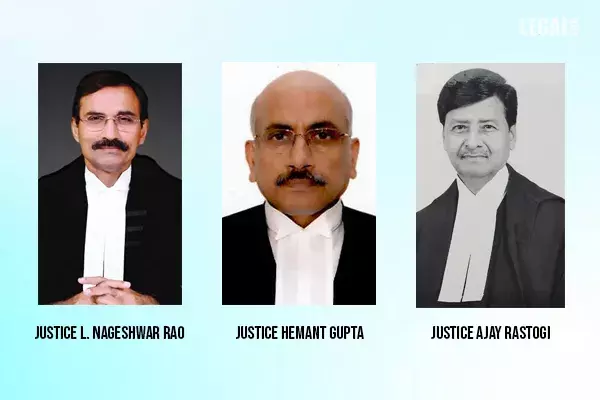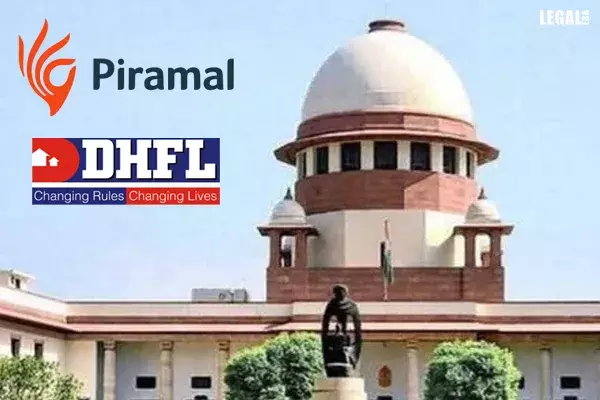SC: 'Secured Creditor Cannot be Invalidated Merely on the Ground of Procedural Defects'
The Supreme Court, bench comprising of Justices L. Nageshwar Rao, Hemant Gupta and Ajay Rastogi observed that proceedings;

SC: 'Secured Creditor Cannot be Invalidated Merely on the Ground of Procedural Defects'The Supreme Court, bench comprising of Justices L. Nageshwar Rao, Hemant Gupta and Ajay Rastogi observed that proceedings which are initiated under the SARFAESI Act by a Secured Creditor cannot be invalidated merely on the ground of technical defects and procedural defects unless substantial prejudice...
SC: 'Secured Creditor Cannot be Invalidated Merely on the Ground of Procedural Defects'
The Supreme Court, bench comprising of Justices L. Nageshwar Rao, Hemant Gupta and Ajay Rastogi observed that proceedings which are initiated under the SARFAESI Act by a Secured Creditor cannot be invalidated merely on the ground of technical defects and procedural defects unless substantial prejudice was caused to the defaulter.
The appellant, L&T Housing Finance Ltd. was a Housing Finance Company under National Housing Bank Act, 1987 and was notified as Financial Institution by the Department of Finance (Central Government) in exercise of the powers conferred by sub clause (iv) of clause (m) of subsection (1) of Section 2 of the SARFAESI Act. The appellant was within the definition of "secured creditor" under the provisions of the SARFAESI Act.
It was revealed from the record that M/s. Trishul Developers through its Partners, the respondents had failed to maintain financial discipline and subsequently became a defaulter and because of the alleged breach of the terms and conditions of the Facility Agreement executed between the appellant and the respondents towards completion of its project. The appellant served a demand notice dated 16th December, 2016 to the respondents to pay the outstanding dues within the stipulated period mentioned in the demand notice.
Since the respondents failed to make their outstanding payment, under the given circumstances the appellant classified the account of the respondents as Nonperforming Assets (NPA) on 15th April, 2017 and had sent a notice of demand dated 14th June, 2017 under Section 13(2) of the SARFAESI Act calling upon the respondents to pay the outstanding dues i.e. Rupees Sixteen Crores as on 31st May, 2017 in terms of the notice with future interest till actual payment within sixty days from the date of the receipt of the demand notice.
In this case, the Debt Recovery Tribunal (DRT) had quashed the demand notice served on the borrower under Section 13(2) of the Securitisation and Reconstruction of Financial Assets and Enforcement of Security Interest Act, on the ground that it has not been validly issued in the name of the secured creditor instead the name of the company was mentioned. According to tribunal this defect, was not being curable after issuance of demand notice by another gbroup company instead of secured creditor. The Karnataka High Court had upheld this order of the DRT.
Supreme Court observed, "In the facts and circumstances, when the action has been taken by the competent authority as per the procedure prescribed by law and the person affected has a knowledge leaving no ambiguity or confusion in initiating proceedings under the provisions of the SARFAESI Act by the secured creditor, in our considered view, such action taken thereof cannot be held to be bad in law merely on raising a trivial objection which has no legs to stand unless the person is able to show any substantial prejudice being caused on account of the procedural lapse as prescribed under the Act or the rules framed thereunder still with a caveat that it always depends upon the facts of each case to decipher the nature of the procedural lapse being complained of and the resultant prejudiced if any, being caused and there cannot be a straitjacket formula which can be uniformly followed in all the transactions."
Adverting to facts of the case, the Court was of the view that the objection raised by the respondents was trivial and technical in nature and the appellant (secured creditor) had complied with the procedure prescribed under the SARFAESI Act.
The court concluded that the objection raised by the respondents in the first instance, at the stage of filing of a Securitisation Application before DRT under the SARFAESI Act was a feeble attempt which persuaded the Tribunal and the High Court to negate the proceedings initiated by the appellant under the SARFAESI Act, was unsustainable more so, when the respondents were unable to justify the error in the procedure being followed by the appellant to be complied with in initiating proceedings under the SARFAESI Act.
The appeal was valid and allowed accordingly. The impugned judgment dated 27th June, 2019 passed by the High Court of Karnataka was thereby quashed and set aside.





